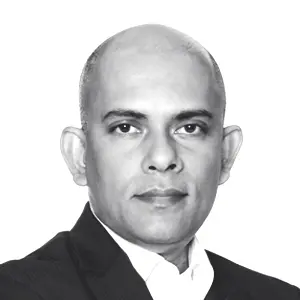 What are your key learnings over the past three years, especially in the context of the evolving theme of ESG? And also in view of tightening regulations around ESG, announcement of guidelines for ESG Ratings Providers (ERPs) in India, and so on.
What are your key learnings over the past three years, especially in the context of the evolving theme of ESG? And also in view of tightening regulations around ESG, announcement of guidelines for ESG Ratings Providers (ERPs) in India, and so on.
While the company was incorporated three years ago, we actually started working on it a year prior to that. ESG rating actually gave us the opportunity to participate in a process of development of a concept and also to contribute to it.So it was very exciting from that aspect. Last 3-4 years have been very rewarding.
Our perception about how corporates are handling the ESG aspect of their businesses has actually changed a lot in last four years. Four years back when I started meeting people and socializing the idea that we will be doing something in this field, I was not sure we will be doing anything in the ESG ratings. So we were discussing about it with people and right from regulators and corporates themselves, a lot of investors and mutual funds and banks, they told that India is inherently a society of confidentiality and people do not want to share the information. We realized early on that we will need to invest a lot on data. This is because there are databases in place to track financial progress of corporate such as CMI, Bloomberg, etc. But we did not have any database for collating ESG-related information.
So we started collating ESG data for the top 500 companies in India. And to our delight, we found that the perception was not accurate. Companies were giving a lot of information and with about 60 to 70% of the companies disclosing majority of the data under the Business Responsibility Report (BRR) which is now replaced by the Business Responsibility and Sustainability Report (BRSR). That was a big learning.
Secondly, we noticed that investors had started pushing companies to adopt ESG in a significant manner and were moving their resource allocation towards new age companies largely because these new age companies met the ESG criteria laid down by several foreign funds and pension funds.
Thirdly, the ecosystem adopted the concept of ESG quite rapidly. In 2019, if one did a Google search using the word ESG or environment, social and governance or ESG rating, they would not find even one article emerging from India. But if you do that today, you will get a lot of articles written by Indian academicians, bankers and so on. Regulators have given a lot of push to the ESG agenda and India was among the first few countries in the world to come up with guidelines such as the BRSR, ERP, and so on. One last learning I would say is that ESG is an evolving concept and we need to be on our feet constantly to stay updated and grow as a company.
After SEBI issued ERP guidelines asking them to get registered, one of the leading international ERP players has withdrawn its ESG ratings offerings from India. Do you think Indian players like you have a huge opportunity? How are you gearing up to make the most of this opportunity?
There are four or five kinds of businesses that can happen in the ESG space. One is ESG ratings, then there is ESG advisory firms who advise companies on how they can improve their ESG performance, which is something that an ESG rating provider cannot do. Then there are assurance companies who guarantee the ESG data provided by the companies. I think ESG Consulting or ESG Advisory is a relatively bigger business because there are big challenges to overcome in this space, especially for companies in Cement, Steel and other sectors to become net zero.
On the contrary, ESG rating business in India, is unlikely to be a multi bagger business. In my estimate, ESG rating opportunity will be probably around Rs. 2,500 Crore three years from now. ESG rating business is a small business, it is a niche business, but it will be a high quality business. It will contribute something to the society. It will help companies understand their own strengths and weaknesses. They will be able to improve themselves and thereby contribute to the net zero goals of the country. So the motivation is largely to make yourself contribute to the society.
What are the key concerns in the ESG space according to you?
We believe that there is a reason why it is important to regulate the ESG space. For example, I have done some study on the mutual funds who are having products called ESG funds. We studied scoring of some ESG funds a couple of years back, and we found that in some cases, the risk scores are lower than that of a banking fund or a PSU fund or even a blue chip fund.
This is one of the big fallacies that we have to overcome. Often, ESG remains a selling tool for some of the financial products. Then, you are not doing ESG. This is the fundamental problem that we have to address. If we as a country have to achieve net zero, we cannot have one set of funds which are ESG compliant and high on ESG score and another set of funds which are low on ESG scores. The whole country has to move towards net zero and therefore all funds, all money, all resource allocation should be dependent on ESG. So, the risks of green washing, rating washing and misusing and MIS selling of these products must be mitigated. And I think SEBI is trying to do that.
You have been publishing reports analyzing the ESG performance of Indian companies every year. What has been your key takeaways, how have the ESG disclosures moved across Indian companies?
When we started four years ago, we had about 700 ESG data points that too not for all companies and we built our ESG rating model based on these data points. After two years, we had to include 300 more indicators in our model. And today, we consider about 1,040 indicators to build the ratings. This means that companies are disclosing more and there are more data points available. And with BRSR coming in, our model is being upgraded again to include about 2,250 data points. We are continuously upgrading our software, tools and our rating models to incorporate these data points. This actually shows how effective BRSR has been and how ESG adoption has grown. There are areas of improvement in that also, but I think the initial response is quite heartening.
Any parting thoughts that you want to leave our readers with?
The key message I have is that ESG should not be limited to ESG rating or ESG funds. ESG is about moving the entire country towards net zero. For that to happen, new science has to come in, new technology has to come in. And this is a huge opportunity for India. But, we have to be careful about using ESG as a marketing ploy.
Related Tags

Invest wise with Expert advice
![]() IIFL Customer Care Number
IIFL Customer Care Number
(Gold/NCD/NBFC/Insurance/NPS)
1860-267-3000 / 7039-050-000
![]() IIFL Capital Services Support WhatsApp Number
IIFL Capital Services Support WhatsApp Number
+91 9892691696
IIFL Securities Limited - Stock Broker SEBI Regn. No: INZ000164132, PMS SEBI Regn. No: INP000002213,IA SEBI Regn. No: INA000000623, SEBI RA Regn. No: INH000000248

This Certificate Demonstrates That IIFL As An Organization Has Defined And Put In Place Best-Practice Information Security Processes.